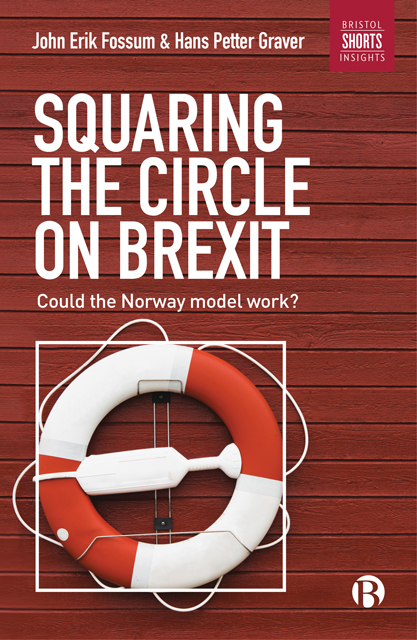Book contents
- Frontmatter
- Contents
- Foreword
- Preface and acknowledgements
- List of abbreviations
- Introduction
- 1 What does Britain want from Brexit?
- 2 Forms of affiliation with non-members
- 3 What is the Norway model?
- 4 The challenge of sovereignty
- 5 What can Britain learn from Norway’s experience?
- 6 Would Britain be an ‘elephant in the boat’?
- Conclusion
- Notes
- References
- Appendix
- Index
6 - Would Britain be an ‘elephant in the boat’?
Published online by Cambridge University Press: 21 April 2023
- Frontmatter
- Contents
- Foreword
- Preface and acknowledgements
- List of abbreviations
- Introduction
- 1 What does Britain want from Brexit?
- 2 Forms of affiliation with non-members
- 3 What is the Norway model?
- 4 The challenge of sovereignty
- 5 What can Britain learn from Norway’s experience?
- 6 Would Britain be an ‘elephant in the boat’?
- Conclusion
- Notes
- References
- Appendix
- Index
Summary
It is widely acknowledged that Brexit will have significant effects for Norway. Norway is by far the biggest state in the EEA, but if the UK, with its far greater population, power and international bargaining clout, joins the EEA, it will surely be the ‘elephant in the boat’. Whether the elephant is good-tempered or bad-tempered matters, but regardless of the mood, its presence will be felt.
As this book has shown, the Brexit process is far too unwieldly and unpredictable to provide us with a clear indication of its eventual outcome. The range of possible outcomes remains very wide ‒ from Brexit without any agreement to continued UK import of EU norms and rules (whether as a member or not). It is therefore necessary to operate with a number of different Brexit scenarios when trying to assess effects on associated non-members such as Norway.
In principle, since non-members have not pooled or shared sovereignty in the EU, one might assume that a closely associated non-member such as Norway would have more leverage in sorting out its future relationship with the UK than would EU member states. However, several factors limit the scope of action for Norway. The Norwegian government has repeatedly underlined that it should not be treated as a third party because it is so closely affiliated with the EU. Nevertheless, because it is only an affiliated non-member it is not present in the negotiations between the UK and the EU (it lacks a seat in the European Council that issues the EU’s negotiation guidelines; it has no political representation in the Council formations; and no representatives in the European Parliament). Nor will Norway be able to reach a bilateral settlement with the UK until there is an agreement between the EU and the UK, due to the exclusive competence in the common commercial policy, the UK cannot sign trade agreements with third parties until it has formally exited the EU. Norway therefore has very limited influence on the terms of the UK’s exit. That of course also extends to the terms of the UK’s future association with the EU, which will also determine the UK’s relationship with the EEA.
- Type
- Chapter
- Information
- Squaring the Circle on BrexitCould the Norway Model Work?, pp. 109 - 128Publisher: Bristol University PressPrint publication year: 2018



